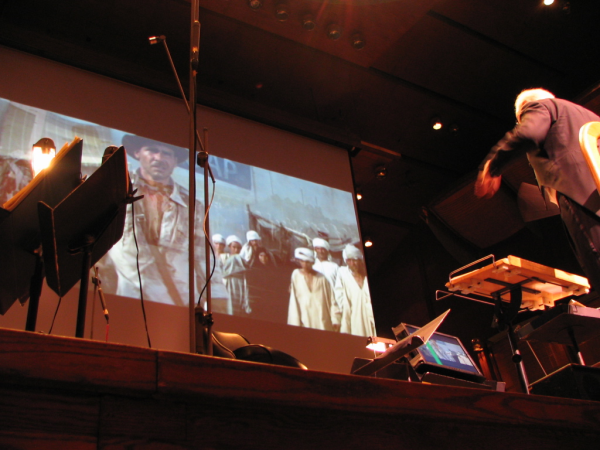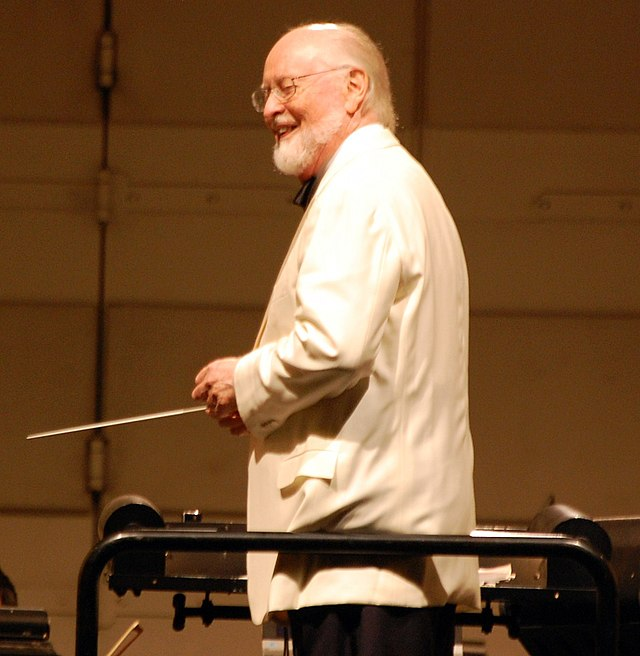“Without John Williams, bikes don’t really fly, nor do brooms in Quidditch matches, nor do men in red capes. There is no Force, dinosaurs do not walk the Earth, we do not wonder, we do not weep, we do not believe,” said Steven Spielberg
Perhaps it’s counterintuitive to believe the most influential man behind Steven Spielberg’s illustrious career that spans fifty years and dozens of films, is the man that stood behind the music stand. Perhaps it’s counterintuitive to think that the true magician behind the Star Wars universe isn’t the founder George Lucas, but the man with a baton and vision for musical magic.
But as Spielberg said, Williams’ work has brought countless stories and worlds to life. Whether it’s Home Alone during the holidays, Jaws during a summer afternoon, or another adventure in a galaxy far far away, the unparalleled musical genius of John Williams has functioned as the soundtrack of millions of peoples’ imaginations.
However, before he brought life to the cinema, Williams’ story begins at humble beginnings. He was born on February 8th, 1932 and was raised in New York, as the son of a CBS radio station percussionist. He was exposed to music at an early age and often tried to compose his own music as a teen. His family moved to Los Angeles in 1948, where Williams studied composition at the University of California, Los Angeles.
Ironically enough, his career of composing joyful, awe-inspiring music began at a military facility. He was drafted into the U.S. Air Force in 1951 during the Korean War, where he arranged band music and began his career as a composer. He also attended music courses at the University of Arizona as part of his training.
1n 1959, Williams’s career in Hollywood began, and it was here where Williams became aware of his talent and passion for musical composition. While working as a concert pianist and attending the Juilliard School of Music, Williams heard some of the most significant contemporary pianists such as John Browning and Van Cliburn. He quickly realized that the magic laid in what he could do with a pen and pencil, and not with a piano.
And Williams took that pen and paper, along with a passion for creation, and never looked back.
Williams first major success was his score for The Valley of the Dolls (1967). Throughout his career, Williams would become known for a very distinct sound that mixes romanticism and impressionism with complex orchestration. In other words, he would use complex musical patterns and sounds to match the overall emotional changes of the scene he was composing for.
However, his diversity of sound is juxtaposed by his relative consistent choice in instruments. Many of his pieces consist of a harmony of strings with brass playing the melody, creating a recognizable sound. This idea is what makes his soundtrack for The Valley of the Dolls so unique, as the score is a take on swinging jazz, which can make anyone feel they are immersed in 1960s pop culture.
What Williams quickly established was his ability to convey emotion through music. His score for Valley of the Dolls was good enough for his first career Oscar nomination. He would receive another nomination for Goodbye Mr. Chips (1967) and would win his first Oscar for his score for Fiddler on the Roof (1971). It was at this point in his career where Williams had established himself as a creative wizard, as well as willing to innovate depending on the film he was scoring.
These qualities attracted the attention of aspiring director Stephen Spielberg, who asked for Williams to score his upcoming film The Sugarland Express (1974). Williams rather hilariously recalled the first time he met Spielberg, “I met what looked to be this seventeen-year-old kid, this very sweet boy, who knew more about film music than I did — every Max Steiner and Dimitri Tiomkin score.”
They would talk over dinner at a luxurious Beverly Hills restaurant. Williams recalled how uncomfortable Spielberg looked, as if he had never eaten at such a place. However, what would follow this simple meeting, would be one of the most storied and important partnerships in cinematic history.

After Sugarland Express, the two would partner again for Spielberg’s next film Jaws (1975). The plot revolved around a killer shark that was terrorizing the beach of Amity Island in New England. When Spielberg initially heard the main theme Williams had created, he thought it was a joke. When confronted by Spielberg’s concern, Williams would truthfully say “sometimes the best ideas, are the most simple ones.”
This piece would end up being one of the most recognizable scores ever created. The slow crescendo of the violins perfectly replicates the impending doom as the killer shark approaches its target. The fortissimo brass at the very end also perfectly demonstrates the power of the shark and the destruction that awaits any person it attacks.
Williams always understood that storytelling is half what you see and half what you hear. He understood that the role of music is to tell a story that goes beyond the words on a script. Perhaps the greatest demonstration of this innate ability is his score for the opening of Jurassic Park (1993).
The premise of Jurassic Park is fairly simple – advanced scientific breakthroughs have allowed experts to bring back to life the dinosaurs. John Hammond then created a park where people can view the dinosaurs, similar to the zoos we have today. Hammond brings two scientists, paleontologist Alan Grant and paleobotanist Ellie Sattler to view the park.
As soon as the scientists lay eyes on the majestic brachiosaurus, a warm melody of strings begins to play. The score is not only pleasant to the ear, but the moderate rhythm mixed with the combination of strings and brass instruments works perfectly to convey the majesty of the dinosaurs. The melody recurs throughout the piece, in slightly different forms before building to the climax where the entire park is displayed, with all the dinosaurs, it is truly a sight to behold.
Jurassic Park at the time would be the highest-grossing movie ever, and the opening scene is one of the most famous in Hollywood history. Through masterful orchestration, Williams was able to bring to life a forgone time period, and convey the beauty of something never beholden to human eyes.
However, for all superheroes, there lies challenges in their story. A challenge for John Williams came when Spielberg asked him to score his upcoming film Schindler’s List (1993). The film was based on the true story of Oskar Schindler, a businessman during the reign of the Third Reich, who uses his manufacturing business to protect Germany’s Jews from the Holocaust. When presented with the project, Williams said “”I really think you need a better composer than I am for this film,” to which Spielberg replied, “I know, but they’re all dead.” Williams would write the music for the movie, which would become one of Spielberg’s most critically acclaimed films.
Lastly, the wondrous work of John Williams is not complete if Star Wars isn’t mentioned. A friend of Spielberg, by the name of George Lucas was working on an extravagant space opera that needed a composer for the film. Spielberg recommended Williams, and what would follow would be a partnership that would span forty years, and the creation of one of the most famous franchises in cinematic history. It focused on a battle between an evil all powerful galactic empire, and a band of rebels fighting against its campaign to rule the galaxy.
Lucas and Williams would go on to create six films together and Williams would score all 11 major films. Across the franchise, lies countless amazing scores that bring to life a universe in a galaxy far, far away. In the prequel trilogy, Duel of the Fates stands out as an epic war theme. The harmony of the choir paired with the staccato strings emphasizes the struggle between opposing forces for supremacy.
In the original trilogy, Williams created another score that would become immortal, The Imperial March. The strong strings compared with the steady beat of the percussion manifest the atmosphere of an enemy marching towards its target. The powerful brass, which stays mainly in the lower octave conveys the unmatched power of the antagonists of this trilogy.
However, Williams could also convey the power behind a movie’s heroes, and in the sequel trilogy he does this perfectly. The March of the Resistance in many ways is similar to the imperial march, with a similar orchestral makeup, but minor changes completely alter its effect on the listener. While the brass maintains the melody, they play an entire octave higher, and the slow crescendo of the melody perfectly conveys the hope the resistance brings to the galaxy.
Ironically, this theme perfectly encompasses the effect Williams has had on the broader society with his music. His music has brought to life countless stories, stories that are out of this world, stories that have made us laugh, and stories that have made us weep. He has brought joy to countless children’s lives, and has united families as they view his cinematic works. His positive effect on our culture is undeniable and unparalleled by any other contemporary composer. His career has spanned sixty years and he is still going strong, and when he lowers his baton for the final time, he shall be recognized as one of the greatest composers to ever live.
“Without John Williams, bikes don’t really fly, nor do brooms in Quidditch matches, nor do men in red capes. There is no Force, dinosaurs do not walk the Earth, we do not wonder, we do not weep, we do not believe,” said Steven Spielberg

